© 2025 ALLCITY Network Inc.
All rights reserved.

A championship would’ve made the upcoming offseason so much simpler for the Phoenix Suns. Coming off a 64-win campaign that had them looking like title favorites, bringing the franchise its first Larry O’Brien trophy would’ve made the check list easy for general manager James Jones: Re-sign Deandre Ayton, give Devin Booker his supermax, extend Cam Johnson and tweak the rest of the roster as needed.
Instead, thanks to a Game 7 meltdown in the second round, the Suns are left with a ton of question marks. The biggest is their former No. 1 overall pick, whose future in Phoenix is murkier than ever.
The Suns probably should’ve rewarded Ayton with a max deal last offseason to keep everyone happy. Resentment about his role crept to the forefront at times. He was vocal about not wanting to be a traditional, rim-running big man. He wanted to do more in the offense. He wanted to win, of course, but he also wanted to get paid.
That lingering discontent exploded in Phoenix’s Game 7 collapse:
Ayton played 17 minutes and did not return after exiting in the third quarter. Williams flatly responded, “It’s internal” when asked about it afterward. The following day, he claimed it was his decision to not put Ayton back in the game, said he had talked to the team but not cleared the air with DA directly, and was noncommittal when asked whether Ayton was a part of the team’s long-term plans.
“Deandre’s situation is something that we’ll deal with this summer,” Williams said. “I don’t want to say anything in regards to that. James and I are going to have conversations about the team in general.”
As for Jones himself, he was much more positive about Ayton’s season and future during his end-of-season media session.
“Deandre had a great season, a really productive season,” Jones said. “I think across the board, you look at what he did, he improved. And that’s a testament to him and the hard work, and that’s what you expect from a player of his caliber. As far as free agency and those things, we’ll address them at the proper time. That’s the time, that happens in July and the end of June. But we want to continue to keep our consistency, our continuity, and keep the guys that we have and continue to help those guys improve upon the things that we did this year.”
There’s little question Deandre Ayton will command a max from someone this summer. Even in a “down” playoff run, he put up 17.9 points, 8.9 rebounds and 0.8 blocks per game, shooting 64 percent from the floor.
He’s a two-way big with elite touch around the basket, finishing 77 percent of his looks at the rim (89th percentile). His touch expanded this season, as Ayton shot a staggering 56 percent on all midrange looks (94th percentile) and an unstoppable 66 percent on hook shots.
At 23 years old, this version of Ayton is nowhere near a finished product. He’s added to his game every season, and when he’s fully locked in, the result is a two-way monster that elevates the Suns’ ceiling to “title contender.”
The problem is, with this sideline flareup and reports of locker room tension between Williams and Ayton, could the Suns be ready to move on? The upcoming offseason figures to be a busy and expensive one.
Upon earning All-NBA First Team honors, Booker is eligible for a no-brainer, four-year, $211M supermax extension that would start in 2024-25. Johnson is up for a well-deserved rookie-scale extension. The first year of Mikal Bridges’ four-year, $90 million extension kicks in next season, starting at $21 million; ditto for the first year of Landry Shamet’s extension, at $9.5 million.
Between that money, Booker’s $33.8 million salary, the last fully guaranteed year of Chris Paul’s contract at $28.4 million, Jae Crowder’s $10.2 million expiring deal, Dario Saric’s $9.2 million expiring, Cam Payne’s $6 million, Cam Johnson’s $5.9 million and Torrey Craig’s $5.1 million expiring, the Suns would have nine players under contract for $129.2 million before even taking Ayton’s new deal into consideration.
With the tax line for next season projected at $150.3 million, any reasonable extension for Ayton would push Phoenix into the luxury tax. That’s been uncharted territory for owner Robert Sarver over the last decade, even if he and Jones have said the tax won’t hinder their plans.
Deandre Ayton sign-and-trade guidelines
Before anyone overreacts to the nature of an article like this: The Suns’ best course of action is still probably to either re-sign Ayton or match another team’s offer sheet for him. Phoenix is in the driver’s seat, given that they can offer more than any other team.
While they probably won’t roll out the full five-year, $177 million max, they can still offer a four-year, $136.6 million deal. The most another suitor can offer is four years and $131.1 million — $5.5 million less. Other teams can gunk up the deal by offering a three-year contract with a player option and trade bonuses, but with their matching rights, the Suns could keep that team in limbo with dead money on the books for two days after the moratorium lifts. That would be July 8, a full week after free agency begins.
Phoenix would be unable to trade Ayton for one year if they were to match another team’s offer sheet, which means it may be in everyone’s best interests to hammer out an agreement early in free agency. DA could take a chance on himself by signing for one more year with the Suns using his qualifying offer, which would be worth an NBA-record $16.4 million, but that scenario is highly unlikely.
If bridges can be mended between Williams and Ayton, a lateral move shouldn’t be the answer. A payday and winning usually fixes everything, and there’s a case to be made for not overreacting to one stunning, uncharacteristic playoff run.
However, Bleacher Report’s Jake Fischer has reported there’s skepticism the Suns would match a max offer for Ayton. That could just be a classic smokescreen, but if that relationship is irreparable, or if DA wants the max and the Suns aren’t willing to go that high, a sign-and-trade may be the next-best move.
There are a few important notes to remember if it comes to that. The Timeline Podcast’s Mike Vigil and Sam Cooper covered this wonderfully with special guest David Nash, but for those who haven’t gotten a chance to listen yet, we’ll go through it all here.
First, a sign-and-trade means Deandre Ayton would effectively agree to sign a new deal with the team he’s being traded to. Sign-and-trades are hard to maneuver, since the two teams and the player need to be satisfied by the terms. The CBA’s rules increase that difficulty.
Any team agreeing to sign-and-trade for Ayton would be offering a three- or four-year max deal, with a starting salary of $30.5 million for the 2022-23 season. However, due to base-year compensation (BYC), Ayton’s outgoing salary value would only be worth $15.25 million. The incoming salary value on the Suns’ end could only be up to that amount plus 25 percent of that amount, which equates to just under $19.2 million. Furthermore, the other team would need to send out about $24 million in salary.
This BYC provision is designed to dissuade teams from signing players to contracts they actually don’t want them on and are simply trying to immediately move them. Other players and/or teams need to be involved to make the math work. A large enough trade exception, or having enough space as an under-the-cap team, can help absorb the new contract. The Detroit Pistons, Indiana Pacers and San Antonio Spurs all have enough room to do so, as ESPN’s Bobby Marks included them among the teams projected to have max cap space this summer.
Another potential road block: Any team engaging in a sign-and-trade for Ayton would automatically be hard-capped at the tax apron, which is approximately $157 million this year. That means they would not be allowed to exceed that amount on their salary cap sheet after the sign-and-trade, or under any circumstance thereafter.
All those reasons combine to explain why sign-and-trade deals historically don’t yield great returns. Bearing all that in mind, let’s finally take a look at a few potential Deandre Ayton sign-and-trades.
NOTE: The base salaries for a few players were slightly off on Fanspo’s NBA Trade Machine, which is why the “success” or “failure” verdict rendered for these deals should be ignored. Fortunately, The Four-Point Play‘s David Nash, our favorite salary cap guru of the Suns community, was kind enough to consult on these deals to make sure the math checked out.
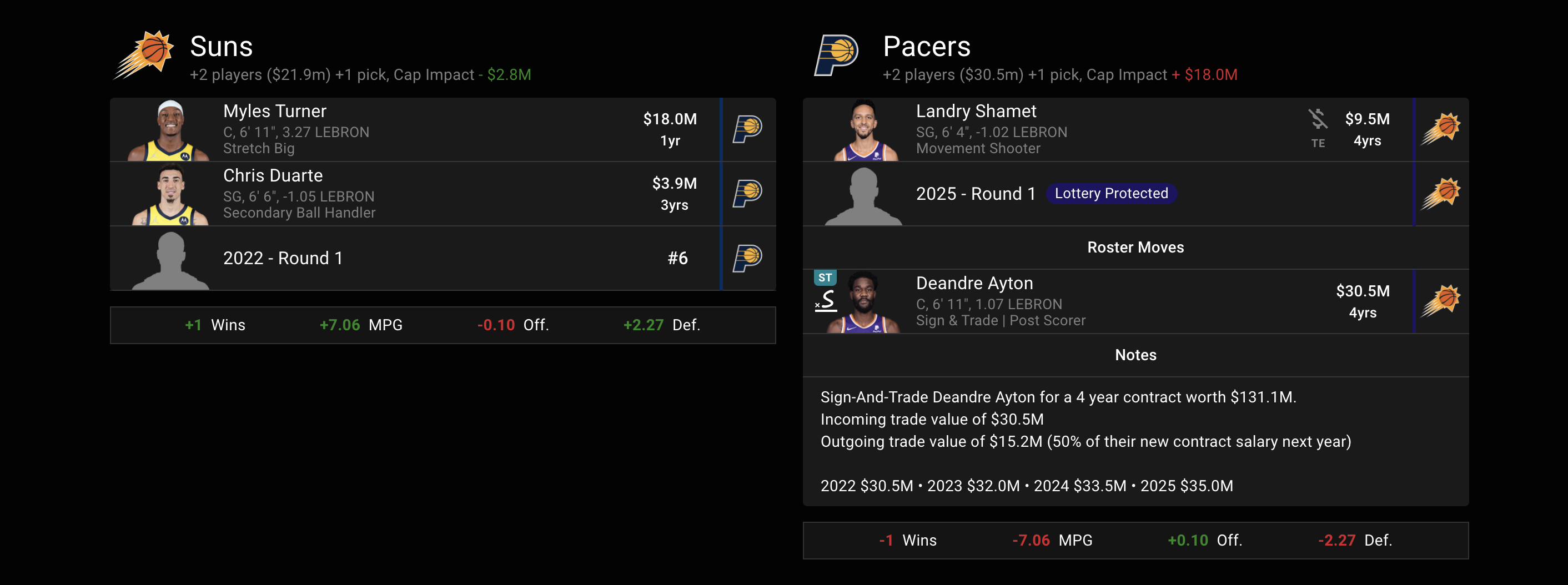
Indiana Pacers
Myles Turner ($17.5M), Chris Duarte ($3.9M) and 2022 No. 6 overall pick ($6.5M) for Deandre Ayton ($30.5M), Landry Shamet ($9.5M) and a lottery-protected 2025 first-round pick
We’ve already heard rumors that the Pacers are willing to give up the sixth overall pick in this year’s draft for Ayton, and The Ringer’s Bill Simmons speculated about the possibility of a deal involving Myles Turner and Chris Duarte.
Mathematically, Turner and the No. 6 pick for Ayton doesn’t work, but throwing in Duarte and Shamet fixes it. The trade fails on Indiana’s side, with about $40 million in salary coming in and only $27.9 million going out, but since the Pacers only have $90.3 million on the books in active roster cap, they can absorb that extra $12.1 million.
One caveat needs to be addressed: These teams wouldn’t technically be allowed to discuss an Ayton sign-and-trade until free agency begins on July 1. With the NBA Draft on June 23, they’d be flirting with the league’s tampering rules unless Indiana drafted a rookie Phoenix was high on with the No. 6 pick.
Assuming that’s not an issue, going from Ayton to Turner is an obvious downgrade. While Indiana’s 6-foot-11 stretch-big has led the league in blocks per game in two of the last four seasons, he doesn’t fit the rim-running archetype that thrives in Phoenix. If Suns fans griped about DA’s lack of tenacity on the glass, they’d be in for a real treat getting acquainted with Turner and his career average of 6.7 rebounds per game.
Turner would bring superior rim protection and spread the floor as a more willing and capable 3-point shooter. He’s averaged at least four long-range attempts per game in each of the last three seasons, but he’s not exactly a marksman, shooting 34.4, 33.5 and 33.3 percent from deep over that stretch.
As for Duarte, the 13th pick in last year’s draft enjoyed an impressive rookie season, averaging 13.1 points, 4.1 rebounds and 2.1 assists per game on 36.9 percent shooting from downtown. He’s a bit old for a first-year player, turning 25 this summer, but he’s a guard with shooting and scoring potential, which is what the Suns need. Adding a top-10 pick to that return gives Jones another opportunity to bolster Phoenix’s long-range attack, even with Shamet going the other way.
This is obviously a lateral move. The Suns would be hoping Turner could bolster the interior defense and that they could find a way to compensate for his rebounding woes, overcoming the downgrade at center by upgrading the shooting.
Tyrese Haliburton, Malcolm Brogdon and DA would be fun, but the Pacers might not be willing to mortgage both Duarte and a top-10 pick for Ayton. That’s where the Suns’ lottery-protected 2025 pick might help ease Indiana’s pain in parting with Duarte. It’d also preserve Phoenix the flexibility to trade their 2023 first-rounder in another deal as soon as draft night 2022.
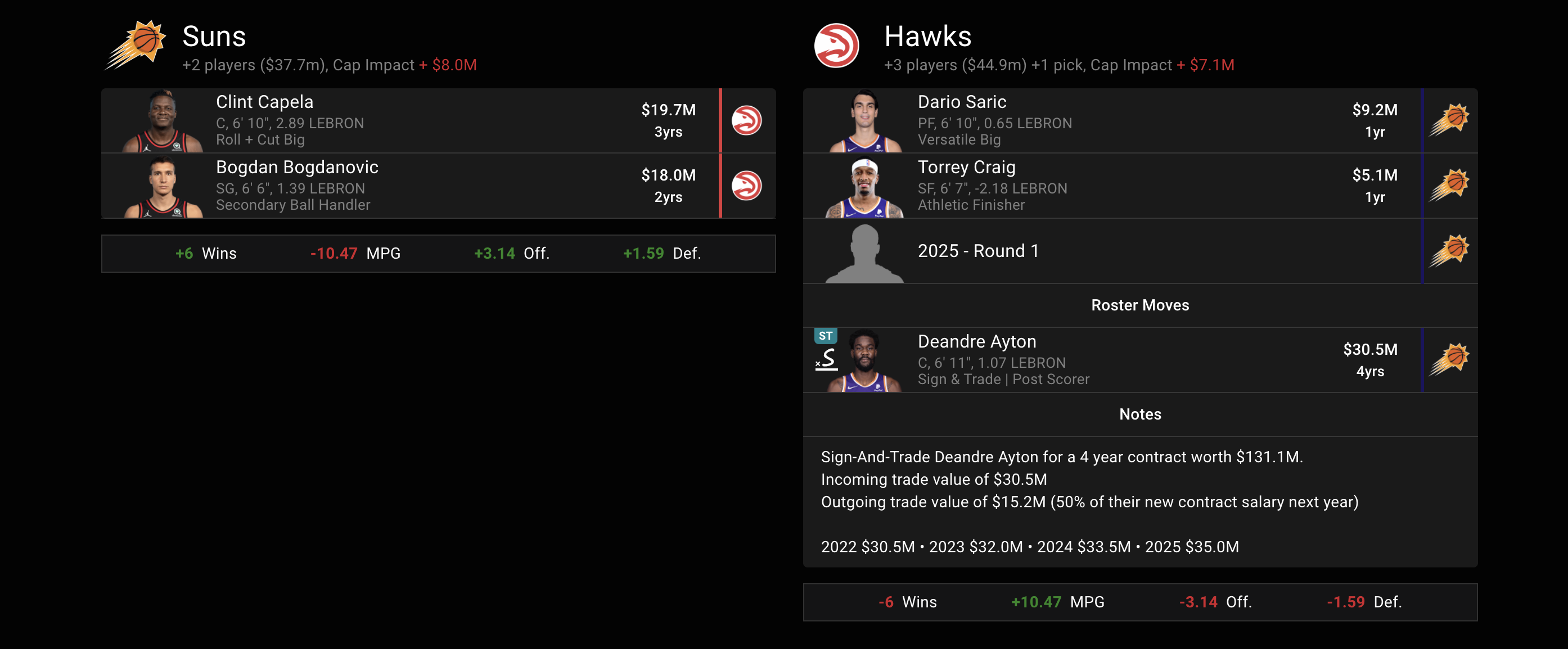
Atlanta Hawks
Clint Capela ($18.2M) and Bogdan Bogdanovic ($18M) for Deandre Ayton ($30.5M), Dario Saric ($9.2M), Torrey Craig ($5.1M) and an unprotected 2023 first-round pick
The original target here was centered around Clint Capela and Kevin Huerter, with Jalen Johnson thrown in as salary filler, but the math was about $500,000 off. Replacing Huerter and Johnson with Bogdanovic checks out…assuming the Hawks are able to dump either Danilo Gallinari ($21.5 million) or John Collins ($23.5 million) for lesser salary elsewhere first.
As it currently stands, the Hawks have $152.8 million in active roster cap on the books. This trade would add $8.7 million in salary, meaning they’d be over that $157 million hard cap — rendering the trade illegal unless Atlanta shed salary first.
However, assuming they could, there are already rumblings that the Hawks are interested in Ayton. A package revolving around Capela would be as close as Phoenix would get in a sign-and-trade to finding a one-for-one Deandre Ayton replacement.
The Suns would still be downgrading at center, but Capela is an elite rim-running big who sets good screens, rolls with purpose as a lob threat, knows his role and would represent an upgrade on the boards. The 28-year-old holds career averages of 10.7 rebounds per game, and has averaged at least 11.9 boards a night in each of the last four seasons.
Capela’s also a more active shot-blocker (1.5 per game for his career) and has experience playing with Chris Paul too. He doesn’t fare as well on the perimeter as DA, which would be a potential issue come playoff time. He also has no touch outside the paint, unlike Ayton.
As for Bogdanovic, Phoenix’s Serbian son would finally be coming home! His inclusion would necessitate Phoenix sending out a future first-rounder, especially with only Saric and Craig joining Ayton. Double Bogdan might be worth it, given his ability to score, shoot, playmake and create his own offense. He’d be a natural bench fit in Monty’s 0.5 offense, averaging 15.1 points and 3.1 assists per game last year. He’s also a career 38.4 percent 3-point shooter on high volume.
However, this might be an overly optimistic hypothetical. The Hawks are looking to shake things up, but is the slight upgrade from Capela to Ayton worth sacrificing Bogdanovic over, especially if all they’re getting in return would be Saric coming off an ACL tear and an average wing like Craig? That’s the primary reason that first-rounder would have to be unprotected and arrive as soon as 2023.
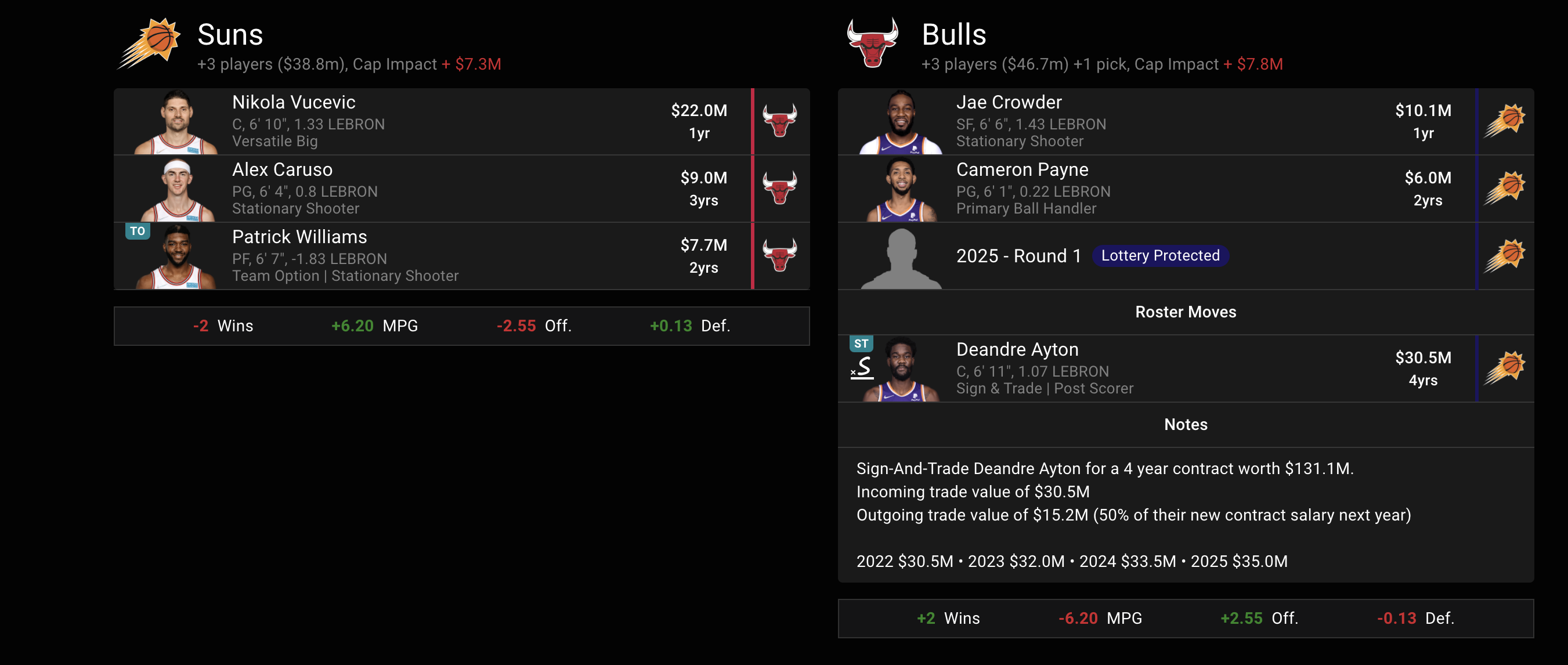
Chicago Bulls
Nikola Vucevic ($22M), Patrick Williams ($7.8M) and Alex Caruso ($9M) for Deandre Ayton ($30.5M), Jae Crowder ($10.2M), Cam Payne ($6M) and a lottery-protected 2025 first-round pick
The Bulls haven’t really been mentioned much as a DA destination, but given their glaring need for upgrades and the underwhelming season Vucevic just submitted, is it really outlandish? Chicago would upgrade at center with a two-way big, add Crowder for wing depth, shooting and veteran experience, and replace Caruso with a potential Windy City redemption tour for Payne. Even better, they’d still have room to re-sign Zach LaVine under the $157 million hard cap, since they’re only at $100 million in active roster cap and would only add $7.4 million more with this move.
From Phoenix’s perspective, Vooch is an admittedly underwhelming centerpiece for a Deandre Ayton deal. But the Suns wouldn’t be dealing from a position of leverage, so a talented offensive big isn’t the worst backup plan. Vucevic still averaged 17.6 points, 11.0 rebounds and 3.2 assists per game in a “down year.” Although he dropped from 38.8 percent 3-point shooting last year to 31.1 percent this season he still shot 47.3 percent overall.
Toss in Alex Caruso’s pesky perimeter defense on a team-friendly deal, plus the athleticism and two-way potential of 20-year-old Patrick Williams, and suddenly this deal looks more attractive. Williams was limited to just 17 games last year due to torn ligaments in his wrist, but his rookie-scale deal is the exact type of cheap, team-friendly production Phoenix needs as the payroll gets pricier.
Since Payne and Crowder are older players with less potential, the Suns toss in a lottery-protected 2025 first-rounder to sweeten the exchange. Cam Johnson is another option in Payne’s place to make the math work, but the Suns would be giving up too much there. Vucevic’s defense would become a problem in the postseason, but the hope is the additional depth pieces would compensate for that pitfall if Phoenix and DA were parting ways no matter what.

San Antonio Spurs
Jakob Poeltl ($9.4M), Devin Vassell ($4.4M) and 2022 No. 9 overall pick ($5M) for Deandre Ayton ($30.5M)
Look, we get it: Jakob Poeltl is the least attractive name of any center on this list. But the Spurs are another team that will definitely be interested in Ayton, Poeltl is a lot better than he’s given credit for, and how about a mulligan on the 2020 NBA Draft with Devin Vassell coming to Phoenix?
The math technically doesn’t check out on San Antonio’s end, but they only have $82.6 million in active roster cap, so they could absorb the additional $12 million into their bountiful cap space. Like the Pacers trade, both sides would have to be careful with any deal involving a 2022 first-round pick, since the date for negotiating sign-and-trades comes about a week after the draft. However, if the Spurs took someone with the No. 9 pick that the Suns were high on, it could work out in the end.
Casting aside those concerns, Poeltl is coming off his best season yet. Averaging a career-high 13.5 points, 9.3 rebounds, 2.8 assists and 1.7 blocks per game, the 26-year-old 7-footer has a well-rounded skill-set that would be enhanced by the Suns’ 0.5 offense and top-five defense. He’s a better passer, he’s efficient on offense (61.8 percent shooting) with a tidy midrange game, and he’s a quietly elite defender and rim protector. As an expiring contract, he’d hold value on the trade market, he’d easily replaceable next summer if he didn’t pan out, and he’d still be retainable if the Suns liked him.
As for Vassell, the 11th overall pick of the 2020 draft won’t turn 22 until August. He drastically upped his game from his rookie year, averaging 12.3 points, 4.3 rebounds and 1.1 steals per game while shooting 36.1 percent from deep. He won’t ever be a No. 1 or a No. 2 option, but Vassell oozes potential. He’s effective in the midrange when chased off the 3-point line and would help shore up the guard and wing positions behind Bridges, Crowder and Johnson.
Nobody in their right minds would be excited about a return like this, but Poeltl might honestly be a defensive upgrade and would more than likely embrace his role without trying to do too much offensively. Throw in Vassell and whatever rookie the Spurs take at No. 9, and the Suns could also get their hands on young, cost-effective depth pieces as well.
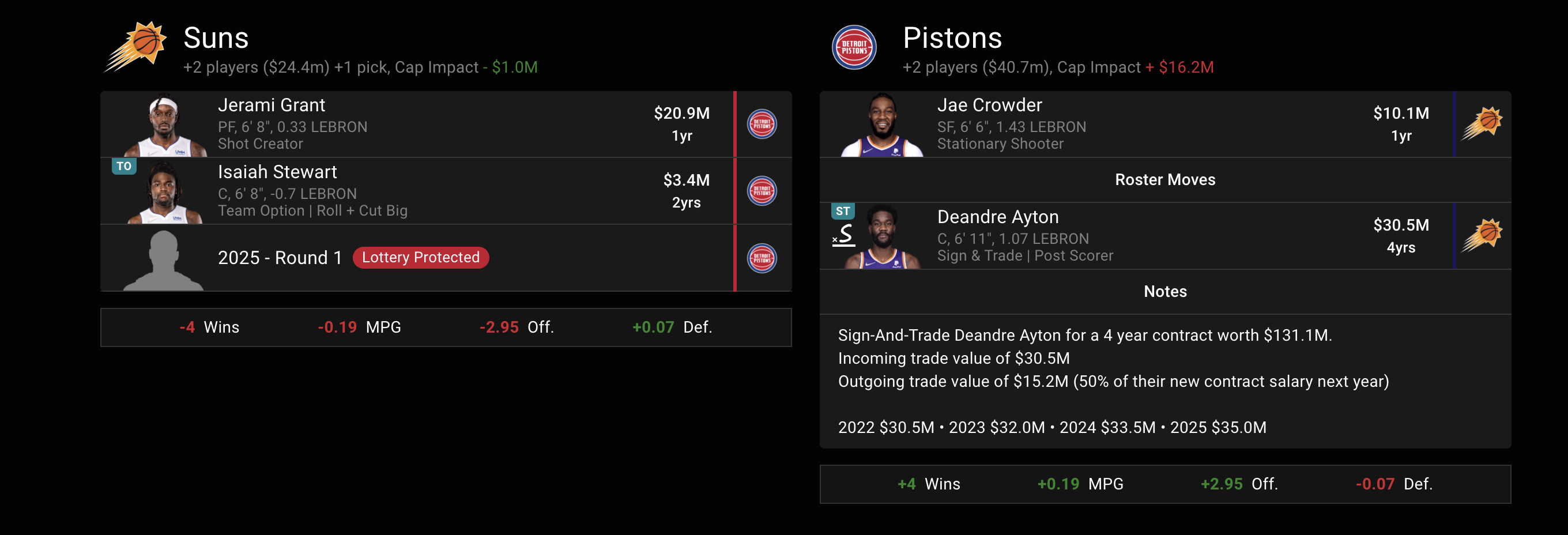
Detroit Pistons
Jerami Grant ($21M), Isaiah Stewart ($3.4M) and lottery-protected 2025 first-round pick for Deandre Ayton ($30.5M) and Jae Crowder ($10.2M)
The Suns would clearly still have work to do after a trade like this, because even if they kept Isaiah Steward and re-signed JaVale McGee and Bismack Biyombo, not one of those guys should start for a title contender — especially come playoff time.
But Stewart is really just there to balance out the financial side and add depth at center. The math doesn’t check out on Detroit’s side, but with only $76.7 million on the books, they have more than enough projectable cap room to eat that extra $16 million in salary. The Pistons are another team rumored to be interested in DA’s services, and although they could afford to sign him outright, they may not want to risk the Suns matching an offer sheet.
Jerami Grant has long been rumored to be available, and he’d be a terrific two-way addition at the 4-spot. He hasn’t been terribly efficient as a primary option the last two years in Motown, shooting 42.8 percent from the floor and 35.3 percent from 3. But he proved on the Denver Nuggets he could be an efficient shooter, scorer and multi-positional defender with enough talent around him.
Although he left a lesser role on a good team like Denver to try and be “that guy” in Detroit, perhaps playing for a title contender would satiate those desires for the time being. His trial by fire as an offensive creator could help Phoenix when defenses key in on Paul and Booker.
Given that he’s only 28 years old, Grant would represent a younger, more spry upgrade over Crowder at the 4. That’d be a pretty nice get for any expiring contract, even if this deal would still leave Phoenix scrambling to find a suitable Ayton replacement.
As for the Pistons, this would be a no-brainer. Pairing Ayton with Cade Cunningham, Saddiq Bey and Killian Hayes would make for a tantalizing young core. Perhaps more than any other environment, Detroit would also allow Ayton to expand his game and try new things, even if it’d probably take a few years for them to start putting wins together.
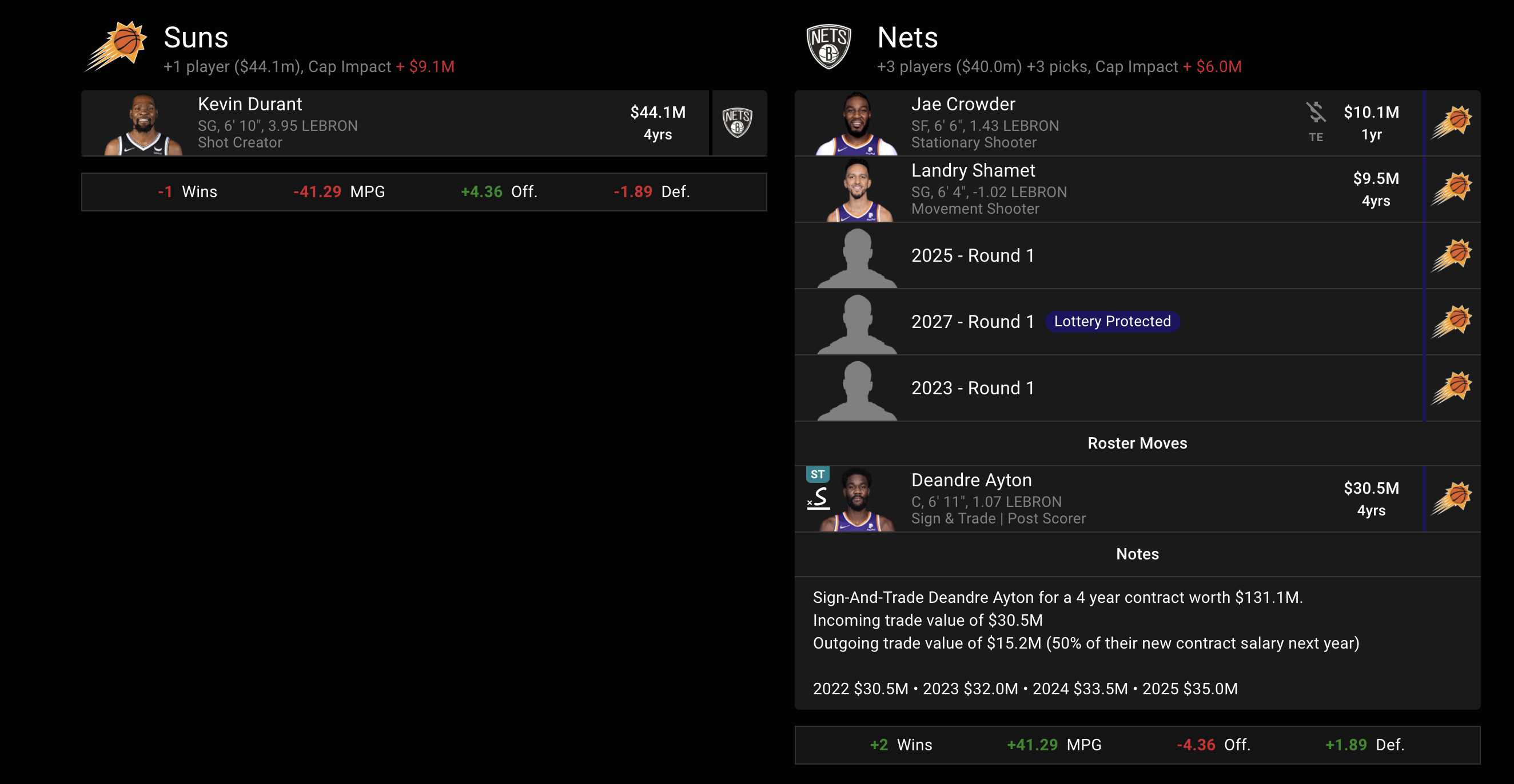
Brooklyn Nets
Kevin Durant ($43M) for Deandre Ayton ($30.5M), Jae Crowder ($10.2M), Landry Shamet ($9.5M) and 3 future first-round picks
To this point, most of our deals have been feasible. Now we’re getting into the star-studded, pie-in-the-sky returns that are highly unlikely at this juncture.
Let’s start with the Nets, who may have trouble on their hands here soon. Their trepidation about re-signing Kyrie Irving to a long-term deal is understandable after the whole fiasco with his refusal to get vaccinated, but if they let him walk in free agency, they don’t have the means to bring in another star to help Kevin Durant. With James Harden already gone and Ben Simmons’ timeline unclear, it may not be long before KD asks out to contend for another championship before his prime is up.
In that scenario, the Suns are as well-equipped as anyone to submit a formidable trade package for one of the game’s all-time scorers. They have the flexibility of mid-level contracts, all of their picks starting in 2023, experienced veterans and young talent to offer.
This only works under the premise that Irving signs elsewhere, which immediately angers Durant, which then triggers a trade demand. Remember, Ayton cannot be traded for a full year if the Suns match an offer sheet for him, which means if that happened and Durant waited until the trade deadline to ask out, Phoenix would have to construct a package without including DA — a tall task.
However, if Irving walks, the Nets would be far enough below the tax apron to fit DA’s new max, Crowder’s expiring salary and Shamet’s extension. The problem is submitting enough value outside of DA to get Brooklyn to bite. Multiple picks would have to be involved, but since Cam Johnson’s inclusion tanks the deal from a financial perspective, a third first-round pick replaces him.
If the Nets want more young talent aside from Ayton and Shamet (who they happily dealt away), this difficult proposition may be the only alternative:
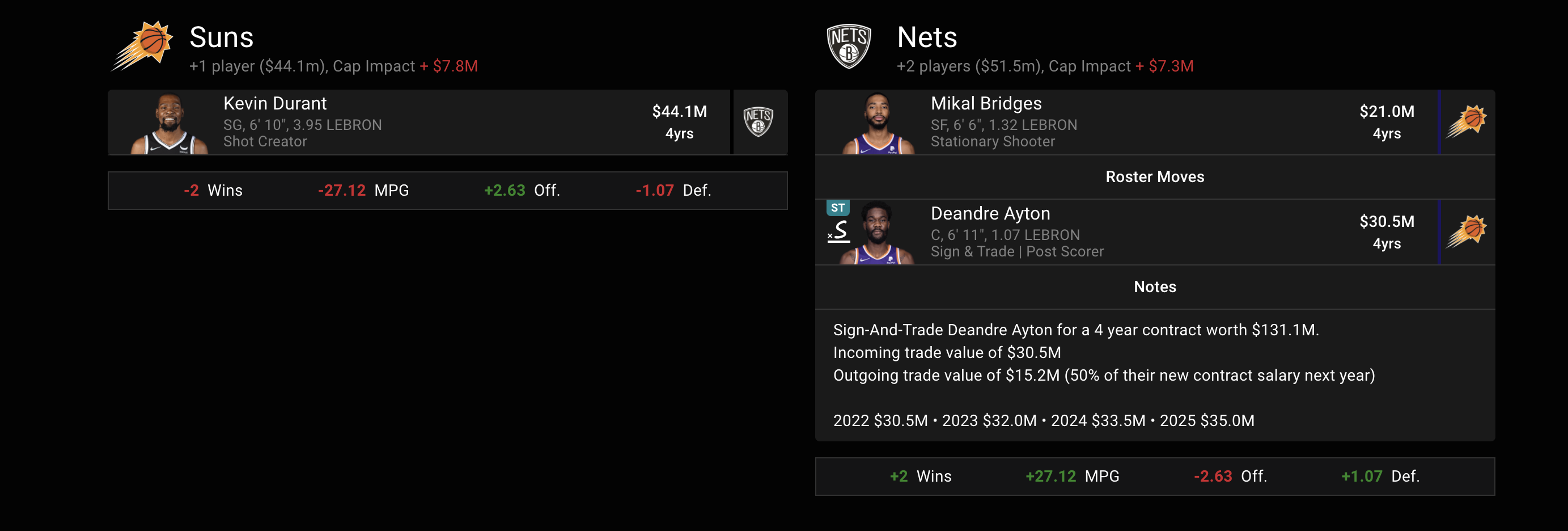
Kevin Durant ($43M) for Deandre Ayton ($30.5M) and Mikal Bridges ($21.0M)
The math checks out, but Mikal Bridges is a fan favorite, Defensive Player of the Year runner-up and continuously meme-able guy who loves playing on this team. He’s a rising two-way star, can shoot the 3-ball, and the defense and culture wouldn’t be the same without him.
Between losing him and DA, this route would be a bitter pill to swallow for the Suns’ fanbase…until you remember they’d still have a core four of Chris Paul, Devin Booker, Kevin Durant and Cam Johnson. They’d need to find a solution at the 5-spot, but that’s a championship foundation. Even with KD’s injury history and his age at 33, if Durant wanted to play with Book and CP3, you do everything in your power to make it happen and maximize that title window.
Remember, this is the guy who just put up 29.9 points, 7.4 rebounds and 6.4 assists per game on .518/.383/910 shooting splits. If you’re looking for someone to take the pressure off Booker and ease Paul’s workload, there’s really nobody better suited for the task than KD.
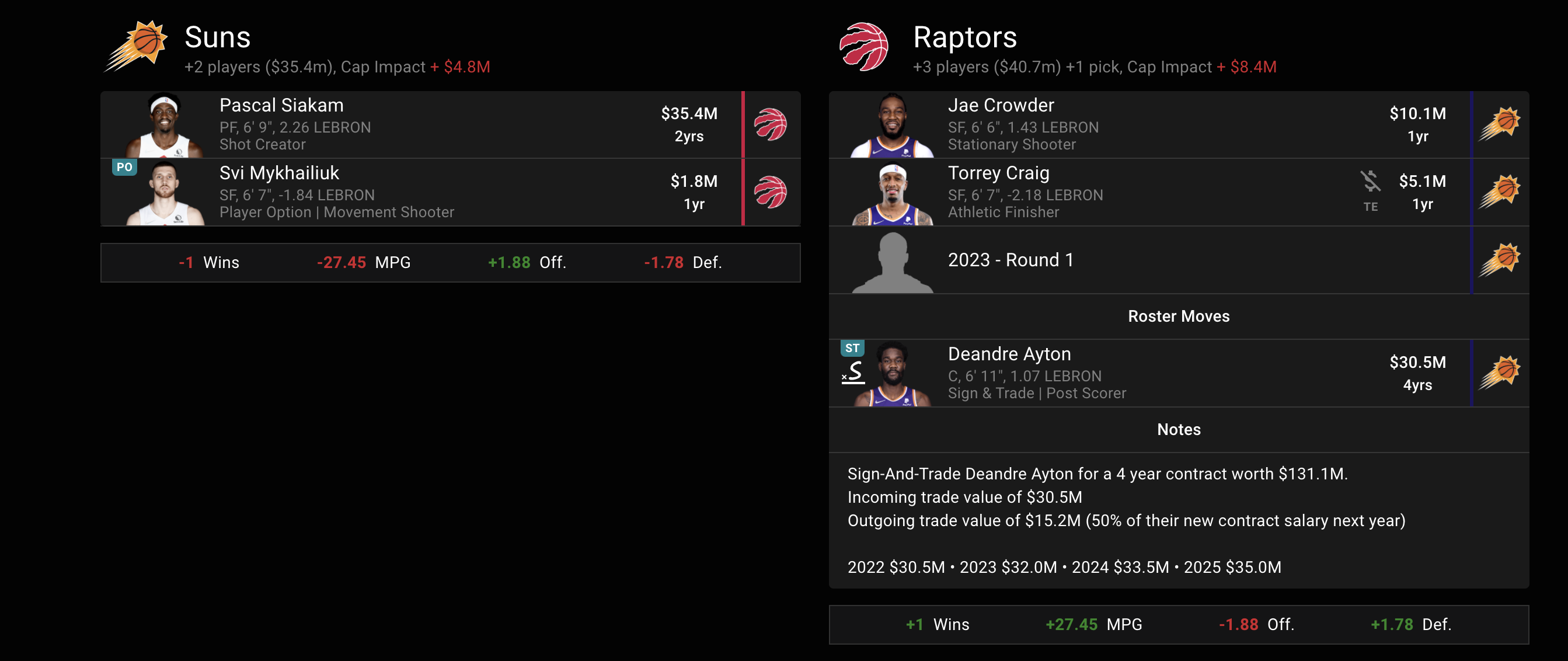
Toronto Raptors
Pascal Siakam ($35.4M) and Svi Mykhailiuk ($1.9M) for Deandre Ayton ($30.5M), Jae Crowder ($10.2M), Torrey Craig ($5.1M) and an unprotected 2023 first-round pick
Pascal Siakam is a name that continually surfaces in NBA trade rumors but makes no sense why he’s there. There was more buzz around his name ahead of this year’s NBA trade deadline, but after earning All-NBA Third Team honors, the Raptors should hang onto him.
If they’re somehow looking to make changes, however, a package of Ayton, Crowder, Craig and an unprotected first-rounder as early as next year isn’t a terrible place to start. The math checks out with rarely-used shooter Svi Mykhailiuk thrown in, and although he probably wouldn’t play much of a role in Phoenix, Siakam sure would.
There are few players that would be a nicer fit at the 4-spot in Phoenix than Siakam, a two-way dynamo who’s blossomed as a primary scorer in Toronto while still doubling as an imposing defender at multiple spots on the floor. Spicy P put up 22.8 points, 8.5 rebounds, 5.3 assists and 1.3 steals this year, shooting 49.4 percent overall and 34.4 percent from deep.
He’s still only 28, would take pressure off the Suns’ backcourt on both ends and, aside from Kevin Durant, represents the best kind of star return Phoenix could reasonably hope to get back in a Deandre Ayton sign-and-trade.
With $115.8 million in active roster cap, the Raptors are nowhere near the $157 million tax apron. They could certainly use an upgrade at the center spot, and DA would be a long-term fit. Crowder and Craig would only enhance their ridiculous wing defense, and this team has proven it knows how to put late first-round picks to good use. Like the KD scenario, this one is highly unlikely, but if it comes to a sign-and-trade, every avenue is worth exploring.
Special thanks to David Nash for his salary cap expertise!
Comments
Share your thoughts
Join the conversation



